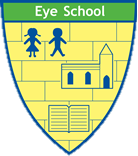Writing
At Eye CE Primary School, we endeavour to create a love of writing. We want every child to leave our school with the skills of an excellent and enthusiastic writer who has the ability to write with fluency; can think about the impact they want their writing to have on the reader and knows how they will achieve this; has a sophisticated bank of vocabulary and an excellent knowledge of writing techniques to improve their writing; can structure and organise their writing to suit the genre they are writing and include a variety of sentence structure; takes pride in their presentation and ensures that their writing is grammatically correct and a writer who edits and improves their writing to the best of their ability.
Pathways to Write
At Eye C of E Primary School, we follow a whole-school mastery approach to writing through the programme Pathways to Write. Units of work are adapted and delivered by our teaching staff using high quality texts and children in all year groups are given varied opportunities for writing. Skills are built up through repetition within the units, and children apply these skills in the writing activities provided. Many opportunities for widening children’s vocabulary are given through the Pathways to Write approach and this builds on the extensive work we do in school to provide our children with a rich and varied vocabulary.
Each Pathways to Write unit covers a range of areas in the national curriculum:
- Mastery of vocabulary, grammar and punctuation skills
- Writing a range of genres across a year
- Vocabulary development
- Using a wider range of reading comprehension strategies as a whole class
- Spoken language activities including drama and presentations
- Opportunities for practising previously taught genres
- An extended, independent piece of writing
This process follows three stages:
The Gateway (1-2 lessons)
- Begin at the Gateway with a ‘hook’ session to intrigue and enthuse young writers
- Use objects, people, images or role-play to stimulate questions about the chosen text
- Give pupils the opportunity to predict the text
- Establish the purpose and audience of the writing
- Revisit previous mastery skills and ongoing skills
The Pathway (approximately 10 lessons)
- Introduce pupils to three new writing skills from their year group curriculum
- Provide opportunities to practise and apply the skill they have learnt through short and extended writing tasks including character descriptions, poetry, dialogue between characters, fact files or diary entries in role
- Provide opportunities to re-cap and apply previously taught skills
- Challenge greater depth writers through a wider range of tasks e.g. changes to form, viewpoint and audience
Writeaway (approximately 4 lessons)
- Section and sequence texts independently or collaboratively
- Create extended pieces of writing over time
- Opportunity to apply mastery skills
- Time for planning, writing, checking, editing, redrafting and publishing
- A fiction or non-fiction outcome will be written (covering a wide range of genres and themes over the year)
Pathways to Write
An overview of Pathways to Write.
Pathways to Poetry
Here at Eye, we understand the importance of poetry and how it can develop both spoken and written language and help to develop our pupils into creative writers. For this reason, every year group has half-termly poetry units embedded within their English curriculum. The Pathways to Poetry units enhance work on vocabulary, spoken language, reading and writing; it gives pupils the opportunity to play with language orally and in writing. From EYFS, where pupils engage with rhymes, up to Year 6, where pupils are creating metaphor. There is an opportunity for all to practise performance and for crafting their own poetry. A wide range of poetry forms and styles are investigated across each year with progression in writing skills weaved throughout.
